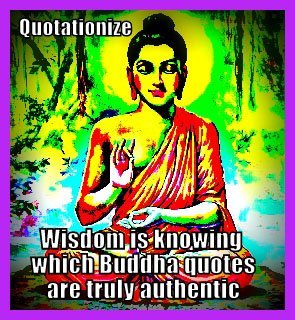Of course the above quote or saying “Wisdom is knowing which Buddha quotes are truly authentic” is NOT from Buddha.
I am trying to say is, there is an abundance of bogus or fake Buddha quotes littered all over those established quote websites and countless books.
All of them, they do not cite their sources. Even if they do, there are countless of misquotes.
By the way, the word “Buddha” is actually NOT the name of the Indian prince or the sage who founded the Buddhist religion.
The word Buddha means “awakened one” or “the enlightened one“. It is a principle, not a person.
Teaching Of Buddha
The man who founded Buddhism teachings was Siddhārtha Gautama.
He was born a royal prince in a place called Lumbini (present-day Nepal).
 It is said that the young Gautama was give the Siddhartha by the king.
It is said that the young Gautama was give the Siddhartha by the king.
He mastered all the traditional arts and sciences on his own.
Besides skilled at mathematics, he also knew sixty-four different languages.
It was his trips outside his protective palace, that he witnessed many old people and sick people, and on one occasion he saw a decaying corpse.
Then only it dawned on Siddhārtha Gautama that that all living beings without exception have to experience the sufferings of birth, sickness, aging and death.
Gautama realized that people experience these sufferings not just once, but again and again because of reincarnation.
To stop all living beings trapped in this vicious circle of suffering, he developed a wish to free all of them from their never-ending pains.
One way to do this was he has to be a fully enlightened Buddha, then only he has the wisdom and the power to help all living beings.
Then left the comfort palace and retire to the solitude of the forest under a pipal tree (now known as the Bodhi tree) where he engaged in deep meditation.
It was after 49 days, he found the truth and attained enlightenment.
Buddhism Is A Way Of Life
Remember Buddhism is NOT a religion. It is a way of life.
It does not ask you to replace your present religious beliefs, only to supplement them with its profound psychological principles.
You can find Gautama Buddha’s words of wisdom from the book, The Dhammapada.
The Buddha’s teaching found on this book is easier to understand, as compared to the one in the Pali Canon (Tipitaka).
Pali Canon is the most complete extant scriptures in the Theravada Buddhist tradition, written in the classical Indian language of Pali.
The Dhammapada is popular not just avowed followers of Buddhism.
This book is a good guide book for resolving the inevitable problems of everyday life.
It focuses on man with his yearning and his suffering, his immense complexity, his striving and movement towards transcendence (existence or experience beyond the normal or physical level).
According to Buddha, he just show us the path; we need to to do the treading ourselves.
We are the maker and master of ourselves, the protector or destroyer of ourselves, the savior of ourselves.
There are twenty-six chapters together with 423 verses in The Dhammapada.
The teachings of the Buddha in this book are expressed in clear, pithy verses.
You will find an amazing collection of inspirational or pedagogical verses on the fundamentals of the Dharmma (virtue), to be used as a basis for personal edification and instruction.
Each verse contains a truth, an exhortation and a piece of advice.
All the teachings of the Buddha found in this book, all linked together into a single message: the attainment of deliverance from suffering.
Due to the massive size of Buddha’s teaching, and to make it easy to grasp, I have broken it down into twenty-six blog posts; as according to the chapters in The Dhammapada.
I include both the English translation together with the verses in the Pali language.
All the verses are linked to the reliable sources.
You don’t need to withdrawn to forest hermitage or mountainside cave for a life of meditation, to read through these words of wisdom.
Just take your time to read through each and every of Buddha’s teaching, and then reflect over them.
I hope you’ll be enlightened by Buddha’s words.
Chapter 1. Pairs (Yamakavagga)
Chapter 2. Appamadavagga (Heedfulness)
Chapter 3. The Mind (Cittavagg)
Chapter 4. Flowers/Blossoms (Pupphavagga)
Chapter 5. The Fool/Fools (Balavagga)
Chapter 6. The Wise (Panditavagga)
Chapter 7. The Arahant or Perfected One/Arahants
(Arahantavagga)
Chapter 8. The Thousands/Thousands (Sahassavagga)
Chapter 9. Evil (Papavagga)
Chapter 10. Violence/The Rod (Dandavagga)
Chapter 11. Old Age/Aging (Jaravagga)
Chapter 12. The Self/Self (Attavagga)
Chapter 13. The World/Worlds (Lokavagga)
Chapter 14. The Buddha/Awakened (Buddhavagga)
Chapter 15. Happiness/Happy (Sukhavagga)
Chapter 16. Affection/Dear One (Piyavagga)
Chapter 17. Anger (Kodhavagga)
Chapter 18. Impurity/impurities (Malavagga)
Chapter 19. The Just/The Judge (Dhamatthavagga)
Chapter 20. The Path (Maggavagga)
Chapter 21. Miscellaneous/Miscellany (Pakinakavagga)
Chapter 22. Hell (Nirayavagga)
Chapter 23. The Elephants/Elephants (Nagavagga)
Chapter 24. Craving (Tanhavagga)
Chapter 25. The Monk/Monks (Bikkhuvagga)
Chapter 26. The Holy Man/ Brahmans (Brahmanavagga)